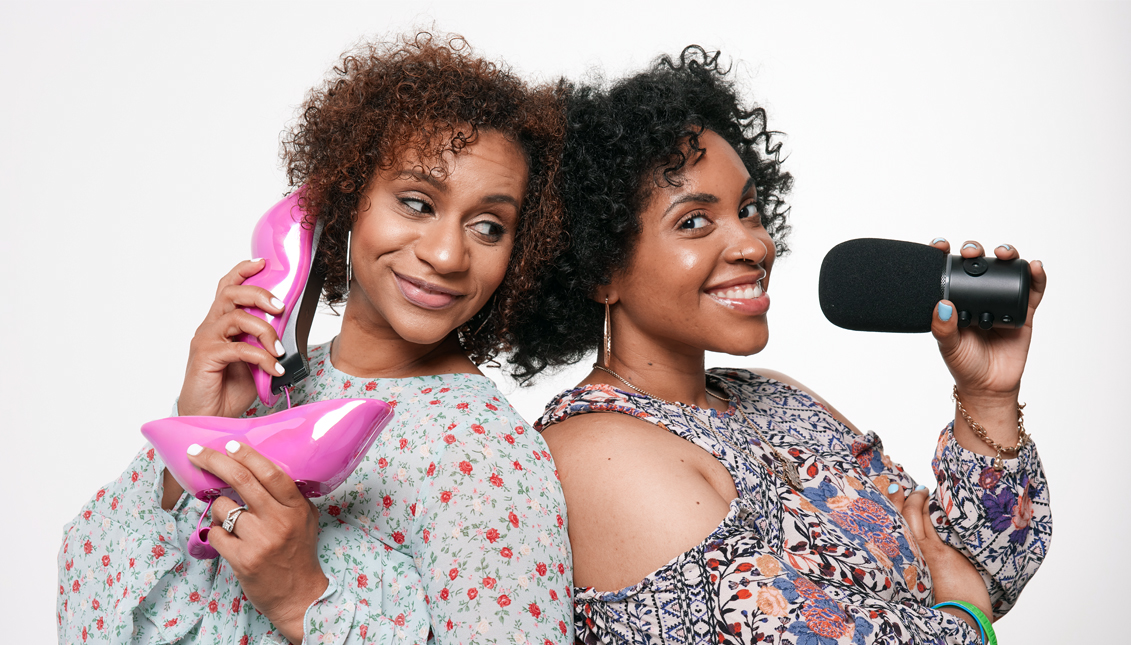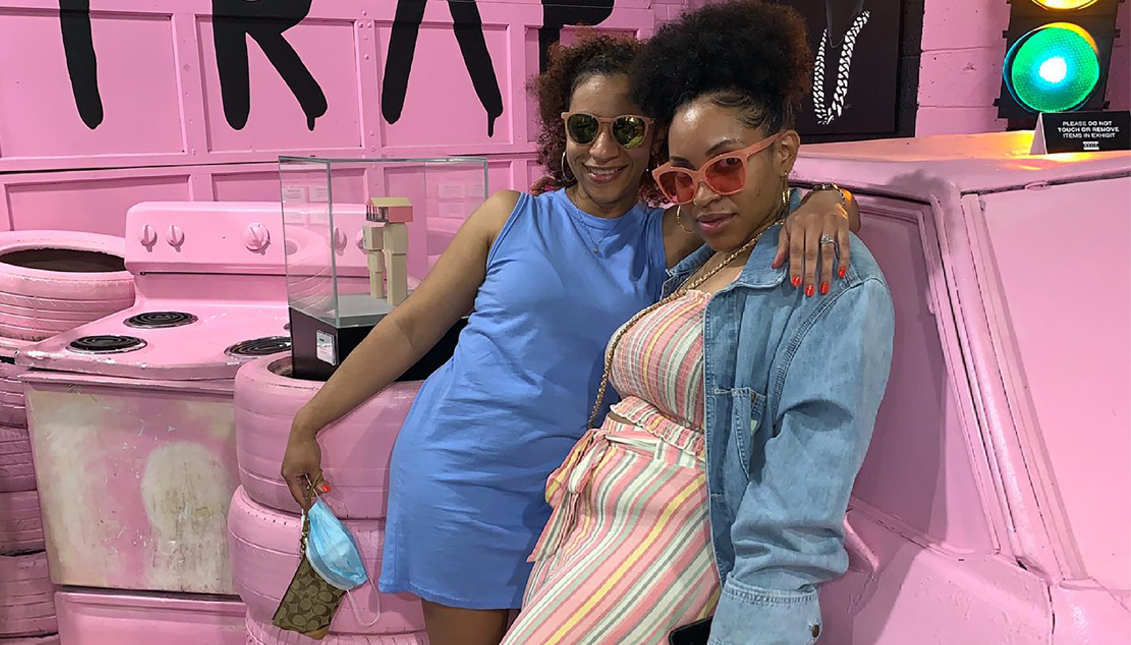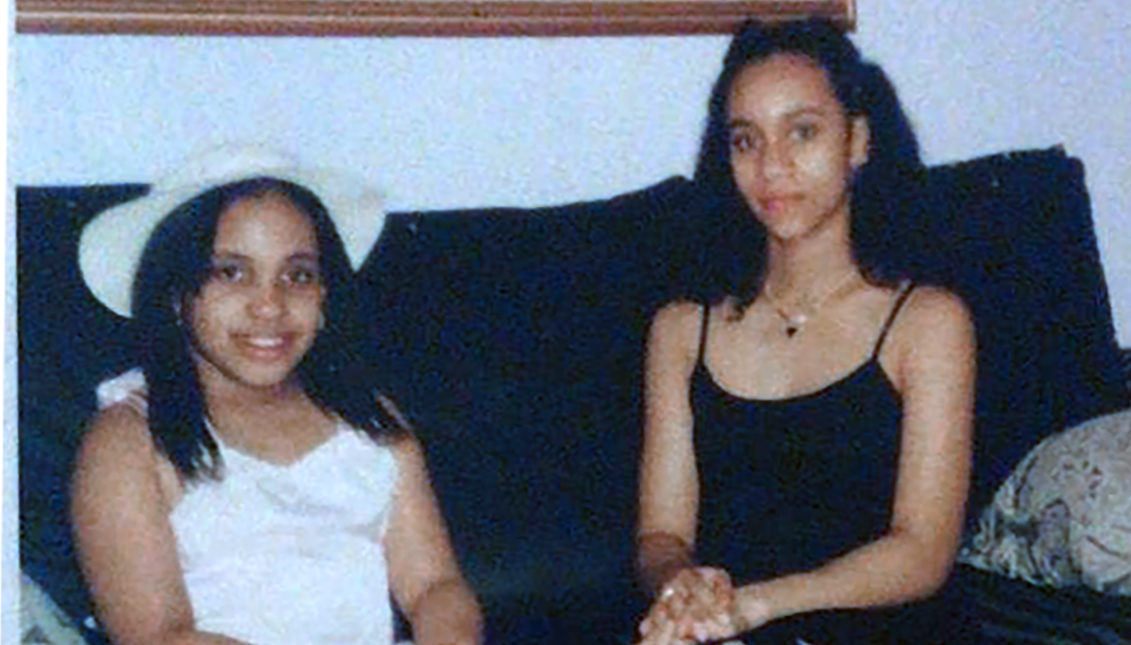
Meet Call Your Sister
Call Your Sister is a podcast from Astrid Ferguson and Alex Hodgethat explores and celebrates the differences among Latinas.
As the need for more Latinx representation in the media becomes more apparent, Call Your Sister, a Philly-based podcast aims to make the experiences of two Afro-Latina sisters and stories of other Latinas heard.
In August 2020, Dominican half sisters Astrid Ferguson and Alex Hodge created Call Your Sister, a podcast aimed at sharing their experiences with motherhood, sisterhood, identity struggles and lived experiences as BIPOC and Latinx women.
“We thought this podcast would be a way to cultivate better conversations to empower women and have conversations about real things,” Ferguson told AL DÍA. “We wanted to highlight stories that talk through these different viewpoints and just give people the space to share their actual stories because I think that there really isn’t just one face to immigration or to Latinx.”

As sisters who moved around a lot growing up, Ferguson and Hodge attribute the start of their podcast to not always having a stable community to share their experiences with.
The podcast became that avenue, and created a way to connect to other Latinas and have a community for those who feel without one.
“We moved around a lot so we didn’t really have a lot of friends that we kept up with,” Ferguson said. “Our hope is to take this podcast to build a community for women to come together and build those connections and grow together.”
Those connections are built through both shared and different experiences.
The Call Your Sister co-founders are both Latinx, but have different lived experiences.
“It was interesting because even though Alex and I grew up in the same household we had similar issues but for different reasons,” Ferguson said.

Ferguson and Hodge, who are five years apart, said they noticed growing up how different each of their experiences were as colorism began to make an impact on them.
“It was a lot of that bias of what we put into that ‘Afro-Latina’ look,” said Ferguson.
“It was a lot of that bias of what we put into that ‘Afro-Latina’ look,” said Ferguson.
She is Dominican and Haitian, while Hodge is full Dominican. Ferguson can remember the questions her sister faced on a regular basis about her identity. Are you really Dominican? Are you really Hispanic? Are you Black?
“It almost became a monkey in a circus type of thing, like to prove that you’re Spanish they would ask for me to say something in Spanish,” Hodge said.
She also added that although both her and her sister are Dominican, she looks more Afro-Latina. The dynamic became an important topic for them to discuss on their podcast along with the overarching theme that not every Latina looks the same or has the same background.
“People wanted to cluster us in one big bubble, so having the conversation, bringing light to that and going into it with an open mind is what we want to share with our listeners,” said Hodge.
As the older sister, Ferguson also experienced her own struggles with colorism growing up.
“I didn’t look like the typical Latina, but I also didn’t look like a typical Haitian so I was stuck in this middle ground of what are you, what do we categorize you as?” Ferguson said.
She went on to explain her own identity crisis growing up because she was never really taught integral parts of her Haitian heritage, like the Creole language.
As a result, Ferguson grew up identifying more with her Dominican side, but also made the effort to learn about colorism and the cross-culturalism of people in today’s society.
One spawn of that effort is Call Your Sister alongside her half-sister.
“[To] really understand about Latindad and why Afro-Latinx was created separate from Hispanic,” Ferguson said of one line of thought. “I think there’s too much of that conversation of trying to put people into a certain category, people don’t fit into just one category anymore.”
For both, the necessity of breaking out of categories is so people are able to choose how they want to identify themselves.
“What I am willing to categorize myself as, that’s my decision and I think that’s what everyone needs to understand regardless of where they come from,” said Ferguson.

Along with those identity issues came the added dilemma of being unable to identify with anyone in popular media, especially for two Latinas.
RELATED CONTENT
“Am I weird? Am I an alien?” Hodge remembers asking herself. “I went through those phases and a lot of self esteem issues, where you see these beautiful women on TV, but they look nothing like me.”
The issue of representation also became an important one to discuss in different podcast episodes of Call Your Sister, and something implemented as a goal to make sure their podcast was a space where others could share their experiences.
The hope is that others can find a little bit of themselves as more Latinas share their stories.
“The more we can get people to open up and share is the only way we are going to get other people to listen,” Hodge said.
However, the need for Latina representation is still a major issue, and Ferguson and Hodge are on the frontlines when it comes to the podcasting sphere.
The podcast medium has allowed listeners to hear a variety of different topics and issues as the format reaches and caters to people across the country. However, it wasn’t until recent years that podcast platforms saw an increase of Latina-based podcasts.
With a list of over 40 Latina podcasts streaming on platforms, Ferguson and Hodge said they saw an increase in Latina-hosted and created podcasts in the early stages of Call Your Sister.
That being said, they also noticed a lack of real everyday stories from Latinas that tackled their differences and similarities, especially through an Afro-Latina lens.
“We have varying storylines and that is what we want to highlight, that just because it’s different, it doesn’t mean it should be removed from the conversation,” Ferguson said. “Many of us struggle with understanding what our identity is, especially when we come here to the United States, especially when we look different.”
More representation is needed to take the next step, which involves not just recognizing the similarities and differences, but using them to overcome some of the barriers faced by Latinas in society.
“The conversation becomes how do we move forward, embracing the small steps. We know as a community it takes each and every one of us for us to move these barriers forward because we are not just dealing with image, but language and culture difference barriers,” said Ferguson.

The Call Your Sister podcast hopes to inspire other Latinas to share their experiences and diversify the media space with varying stories of other Latinas across the country.
“There’s a lot of things that we have to overcome to be confident in the media, to be confident in telling our stories, but it all starts somewhere,” Ferguson said.
As the Call Your Sister podcast continues to release new episodes and share a variety of experiences, both Ferguson and Hodge said they hope to continue to create a community where all Latinas can learn from each other.
“We’re all Latinos and we have to figure out how we can come together and support each other and not just say this is what makes you different from me,” Ferguson said. “It should be because you are different, we should have more of these conversations so we can learn from each other and I think the only way we can flatten the divide is if we have more of these conversations and highlight their stories.”










LEAVE A COMMENT: